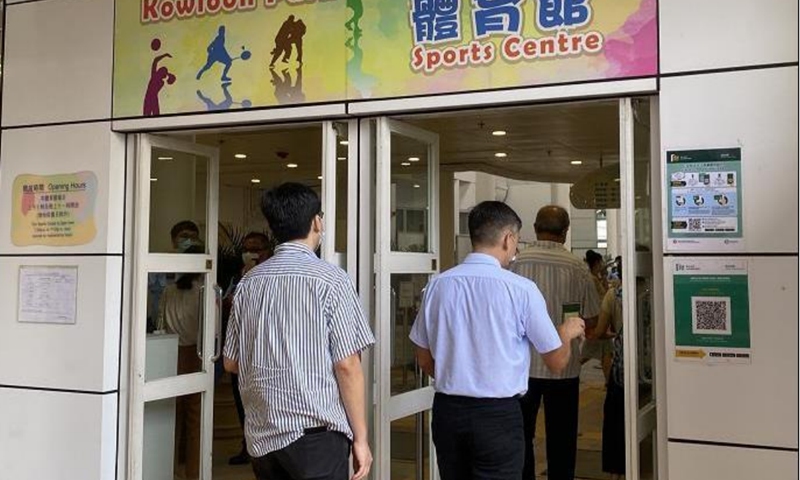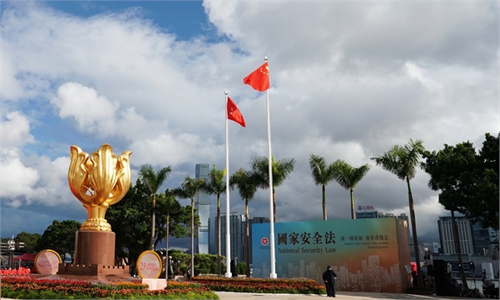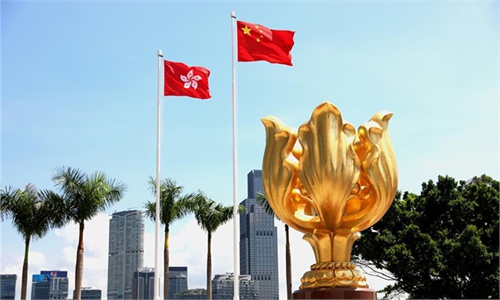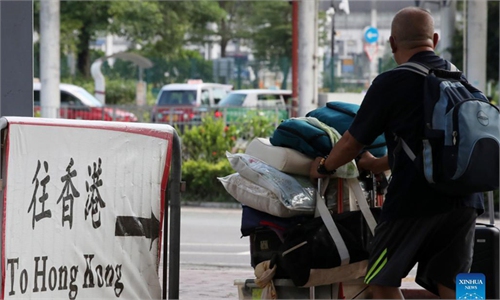Balloting to select HKSAR Election Committee completed, to bring fresh governance to the city

Voters queue up at polling stations to choose the 2021 Hong Kong Election Committee on September 19. Photo: CCTV News
Hong Kong Special Administrative Region (SAR)'s first election since major electoral reform was introduced concluded balloting on Sunday, with local voters selecting the 1,500-member Election Committee (EC), which will be empowered to elect the SAR's legislative council and chief executive later.
Hong Kong SAR Chief Executive Carrie Lam expounded the significance of the EC election for Hong Kong's return to normalcy from chaos in 2020, while observers called it a remarkable turning point to rebuild Hong Kong's governance structure.
The 2021 Hong Kong EC polling stations opened from 9 am to 6 pm on Sunday, and the voting is widely considered as the first election under the new principle of "Patriots Governing Hong Kong." Lam said the election was of great significance to the SAR when she visited polling stations Sunday morning. Ballot counting was ongoing as of press time.
The election is expected to bring a new phase to Hong Kong's political landscape, and ensure "Patriots Governing Hong Kong," and the EC will pave the good way for the ensuing two pivotal elections: the Legislative Council (LegCo) election on December 19, and the Chief Executive election on March 27 next year, said Lam.
She also pointed out that enlarged Election Committee that absorbs participants from a wider range of the local community which enables new voices to be heard.
Under the new political structure, this election is the first time since Hong Kong's return to the motherland and the election is administered in a peaceful atmosphere without any disturbance from rioters, Lau Siu-kai, vice-president of the Chinese Association of Hong Kong and Macao Studies, told the Global Times on Sunday.
Hong Kong SAR's electoral reform plan was approved by China's National People's Congress Standing Committee on March 30, with revised measures for the EC election, and ways for electing the Hong Kong chief executive and the formation of the LegCo, which is seen as a major step in addressing loopholes in the city's governance structure.
Another major change in the Hong Kong electoral system involves adding more candidates from organizations that love the nation and also love Hong Kong, including adjusting the seats of members of the National Committee of the CPPCC and representatives of Hong Kong members of relevant national organizations, which will allow more patriots to be part of the EC.
Given the increasing contribution of mainland capital to Hong Kong SAR's economy, seats on the EC have broken the monopoly pattern of dominance by local businesses, Tian Feilong, an associate professor at Beihang University and a member of the Chinese Association of Hong Kong and Macao Studies, told the Global Times on Sunday.
The rules change supports Hong Kong's regulatory system to better respond to the essential needs of local residents, Tian noted.
On Saturday, Chinese Vice Premier Han Zheng called on Hong Kong SAR to ensure the upcoming three major elections are well organized and executed based on the principle of "Patriots Governing Hong Kong" while meeting with Lam in Shenzhen city.
"The EC election has been fairly expected as the first election since the principle of 'Patriots Governing Hong Kong' and the National Security Law for Hong Kong were implemented. It is a rational, orderly and fair election full of healthy competition and interaction, in sharp contrast to the vicious acts such as groundless invective, street violence and personal attacks seen in previous elections," Louis Chen, general secretary of Hong Kong Legal Exchange Foundation, told the Global Times on Sunday.
"Notably, some newly elected EC members have stepped into the community to get stronger connection with grassroots masses and hear their voices. Most of elected ones are learning quickly about national policy, and expected to be a 'liaison' between the mainland and Hong Kong," said Chen.
More young people were elected this time than in previous elections, which shows that the Election Committee will pay more attention to serving Hong Kong's young people in the future, Nixie Lam, a member of the All China Youth Federation and newly elected EC member, told the Global Times.
Another elected young member Angus Ng Hok Ming, who is also executive president of the Guangdong-Hong Kong-Macao Greater Bay Area Youth Association, told the Global Times that he was excited to see more young members elected to the EC.
"The booming development of the Greater Bay Area provides Hong Kong SAR's young people with a vision of an appealing future, and we hope to better solve deep-seated problems for Hong Kong through closer interaction with the mainland."
During the election of the EC, the Candidate Eligibility Review Committee (CERC) - responsible for reviewing and confirming the eligibility of candidates for the EC membership - performed their function as reflected in disqualifying radical opposition figure Cheng Chung-tai's LegCo seat.
This sends a clear signal that radical opposition figures have no chance to infiltrate the election and get elected until they keep reforming and meeting the basic line of "Patriots Governing Hong Kong," Tian told the Global Times.
Tian said the election also saw attempts by centrist and would-be "patriotic opposition" candidates who pass the qualification checks. This shows that Hong Kong is a pluralistic society, and that the new electoral system will bring about a new political ecology to the city.



